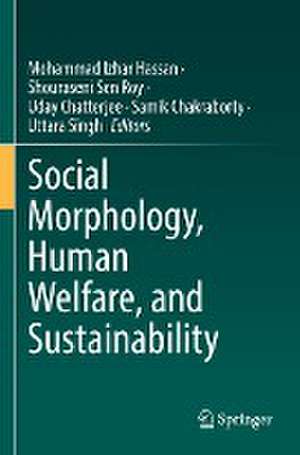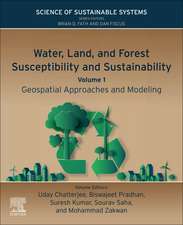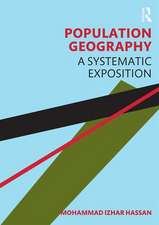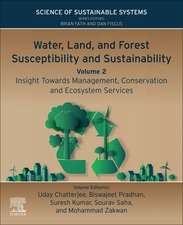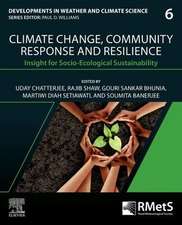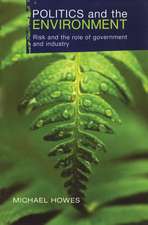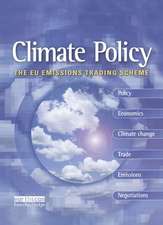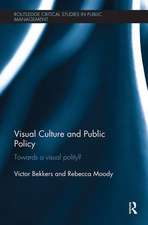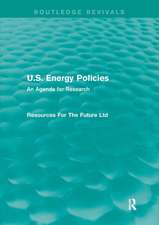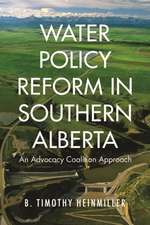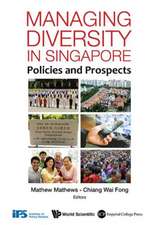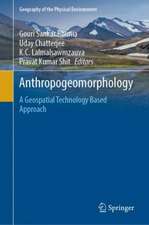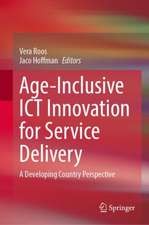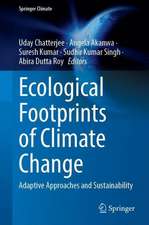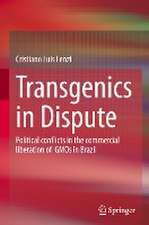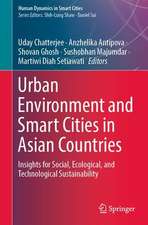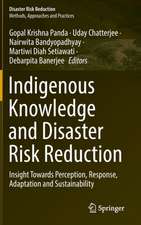Social Morphology, Human Welfare, and Sustainability
Editat de Mohammad Izhar Hassan, Shouraseni Sen Roy, Uday Chatterjee, Samik Chakraborty, Uttara Singhen Limba Engleză Paperback – 9 iul 2023
| Toate formatele și edițiile | Preț | Express |
|---|---|---|
| Paperback (1) | 1392.20 lei 6-8 săpt. | |
| Springer International Publishing – 9 iul 2023 | 1392.20 lei 6-8 săpt. | |
| Hardback (1) | 1398.62 lei 6-8 săpt. | |
| Springer International Publishing – 9 iul 2022 | 1398.62 lei 6-8 săpt. |
Preț: 1392.20 lei
Preț vechi: 1697.80 lei
-18% Nou
Puncte Express: 2088
Preț estimativ în valută:
266.63€ • 274.71$ • 223.36£
266.63€ • 274.71$ • 223.36£
Carte tipărită la comandă
Livrare economică 24 februarie-10 martie
Preluare comenzi: 021 569.72.76
Specificații
ISBN-13: 9783030967628
ISBN-10: 303096762X
Ilustrații: XXIX, 739 p. 224 illus., 196 illus. in color.
Dimensiuni: 155 x 235 mm
Greutate: 1.06 kg
Ediția:1st ed. 2022
Editura: Springer International Publishing
Colecția Springer
Locul publicării:Cham, Switzerland
ISBN-10: 303096762X
Ilustrații: XXIX, 739 p. 224 illus., 196 illus. in color.
Dimensiuni: 155 x 235 mm
Greutate: 1.06 kg
Ediția:1st ed. 2022
Editura: Springer International Publishing
Colecția Springer
Locul publicării:Cham, Switzerland
Cuprins
1-Environment, Society and Sustainability: A Human-Nature Interface.- 2-Social Welfare and Sustainable Development: Paradigm Shift.- 2-Ensuring Social Security for Child and the Elderly People.- 3-Geo-heritage and Geo-Ecotourism Conservation- Case Study.- 4-Resource Allocation and Sustainable Development.- 5-Welfare Schemes for Socially Vulnerable Segments.- 6-Population Growth, Poverty and Inequality.- 7-Illiteracy, Unemployment, Underemployment and Migration.- 8-Slums and Issues of Educational Sub-normality of Social Poor.- 9-Urbanization & Housing Affordability, Requirements of the Marginalized People.- 10-Gender Inequality, Women Health Issues and Women Empowerment.- 11-Climate Change and its Social Consequences and adaptation.- 12-Flood and its Impact on Human Livelihoods on Global South- Case study.- 13-Drought and its Associated Social Responses- Case study.- 14-Access to Basic Amenities, Healthcare Services and Mass Education.- 15-Sustainable Agriculture & Rural Development, Industrialization as a Source of Employment.- 16-Protection of Civil Rights, Transgender Equality, Vocal for Local and Ecofeminism.- 17-Conclusion.
Notă biografică
Dr. Mohammad Izhar Hassan (b.1960) retired as a Professor of Geography from Maharshi Dayanand University, Rohtak, Haryana (India). After obtaining Ph.D. from JNU, New Delhi, he began his teaching career in the year 1991. His area of interest is population studies in geography. He has also served as Professor at Ravenshaw University, Cuttack (Odisha) during 2014-17 where he taught population geography to undergraduate as well as postgraduate students. During 2004-07, he availed UGC Research Award on a project entitled Demographic Situation in Odisha and its Development Implication. Nearly three dozen research scholars have obtained their Ph.D. / M.Phil. under his supervision. He has to his credit five books (the latest being Population Geography: A Systematic Exposition by Routledge in 2020, Climate Change and Bio-Diversity, Vol.1, Springer: Tokyo, Heidelberg, New York and London (2014) [ISBN 978-4-431-54837-9] • Landscape Ecology and Water Management, Vol.2, Springer: Tokyo, Heidelberg, New York and London, (2014) [ISBN 978-4-431-54870-6]) and more than 40 research papers published in journals of national and international repute. He is life member of several professional bodies/ societies including Indian Association for the Study of Population, Indian Regional Science Association, National Association of Geographers India, Institute of Indian Geographers, Geographical Society of India, Eastern Geographical Society etc.
Dr. Shouraseni Sen Roy received all her pre doctoral education from the University of Delhi, including BA, MA, and MPhil. She completed her PhD from the Arizona State University in 2005, and started as an Assistant Professor in the Department of Geography and Sustainable Development, University of Miami since 2018. Her core area of research over the last two decades has concentrated on expanding our understanding of long-term trends in climatic processes, in view of impending climate change. Her research methodology incorporates extensive spatial analysis using advanced geo-statistical techniques to analyze trends in climatic variables. In addition to researching on climate processes over the Indian subcontinent, she has addressed targeted climate-related research questions in other regions of the world including the United States, Myanmar, Burundi, China, and South Africa. In addition, she has recently started working on crime patterns in south Florida. Her research has been funded by the National Geographic Society, American Association of Geographers, and American Institute of Indian Studies. She recently completed a 2018-2019 Fulbright Nehru U.S. Scholar in India to study the role of urbanization on groundwater levels in two megacities of India. Books and monographs published: Sen Roy, S. and R. B. Singh, 2002. Climate Variability, Extreme Events and Agricultural Productivity in Mountain Regions. Oxford & IBH Publishing Co. Pvt. Ltd., Delhi. Sen Roy, S. 2018. Linking Gender to Climate Change Impacts in the Global South.
Dr. Uday Chatterjee is an Assistant Professor at the Department of Geography, Bhatter College, Dantan, Paschim Medinipur, West Bengal, India and Applied Geographer with a Post-Graduate in Applied Geography at Utkal University and Doctoral Degrees in Applied Geography at Ravenshaw University, Cuttack, Odisha, India. He has contributed various research papers published in various reputed national and international journals and edited book volumes. He has authored jointly edited books entitled ‘Harmony with nature: Illusions and elusions from Geographer’s perspective in the 21st Century’, and ‘Land Reclamation and Restoration Strategies for Sustainable Development’ (November 2021, Edition: 1st, Publisher: Elsevier, Editor: Dr. Gouri Sankar Bhunia, Dr. Uday Chatterjee, Dr. Anil Kashyap, Dr. Pravat Kumar Shit. He has also conducted (Convener) one Faculty Development Programme on ‘Modern methods of teaching and advanced research methods’ sponsored by Indian Council of Social Science Research (ICSSR), Govt. of India. His areas of research interest cover Urban Planning, Social and Human geography, Applied Geomorphology, Hazards & Disasters, Environmental Issues, Land Use and Rural Development. His research work has been funded by the West Bengal Pollution Control Board (WBPCB) Govt. of West Bengal, India. He has served as a reviewer for many International journals. Currently Dr. Uday Chatterjee is the lead editor of Special Issue (S.I) of Urbanism, Smart Cities and Modelling, Geojournal, Springer.
Dr. Samik Chakraborty is an Assistant Professor of Geography in Manbhum Mahavidyalaya, India. He was associated with Vivekananda College, Thakurpukur, Kolkata, Jogesh Chandra Chaudhuri College, Kolkata and Lyceum Study Centre, Kolkata. He was awarded Ph.D. in Applied Geography from Ravenshaw University, India. His area of academic interests includes waste management, qualitative research methodology and contemporary social issues in Human Geography. He contributed in several journals and books in home and abroad and shared research ideas in seminars and conferences as an entrant and also as an invited speaker. He acted as a reviewer for GeoJournal, Springer, CRC Press, Taylor & Francis Group and Academia Letters. He was the Convener of the ICSSR-ERC sponsored International Conference on ‘Society & Sustainability: An Interdisciplinary Approach’ organized by Vivekananda College, Thakurpukur, Kolkata and Eastern Geographical Society, Utkal University, Bhubaneswar, Odisha and the Assistant Coordinator of the National Webinar on ‘Contemporary Issues in Geography’ organized by Manbhum Mahavidyalaya, India. He was on the board of editors of ‘Eastern Geographer’ journal (Vol. XXIV, No. 1 & 2, ISSN: 0973-7642). Moreover, he is the life member of National Association of Geographers, India, Institute of Indian Geographers, Geographical Society of theNorth-Eastern Hill Region, Eastern Geographical Society, Association of Punjab Geographers, Geographical Society of Himachal Pradesh, Geography Association of Mizoram and The Association of Geographers, Bihar & Jharkhand.
Dr. Uttara Singh is an Urban Geographer with a Post-Graduate and Doctoral Degree in Geography, from University of Allahabad, Prayagraj, India. She has contributed into various research papers published in reputed national and international journals and edited book volume. She has authored book titled ‘Way of Life in Slums of Delhi: A Geographical Perspective”. She is Life Member of several academic societies of repute. In addition, she has participated and presented 16 papers in national and international seminars/conferences held in India and abroad, as well as chaired and co-chaired many technical sessions. She has successfully guided project dissertations to undergraduate and postgraduate students. She has also conducted (as a Convener) and is still coordinator for ISRO Outreach Program for Remote Sensing and GIS Program sponsored by IIRS Dehradun. Her areas of research interest cover Urban, Social and Human geography, Hazards & Disasters, Environmental Issues, Land Use and Rural Development. Currently Dr. Uttara Singh is working as an Assistant Professor in the Department of Geography, CMP Degree College, University of Allahabad, Prayagraj, Uttar Pradesh, India.
Dr. Shouraseni Sen Roy received all her pre doctoral education from the University of Delhi, including BA, MA, and MPhil. She completed her PhD from the Arizona State University in 2005, and started as an Assistant Professor in the Department of Geography and Sustainable Development, University of Miami since 2018. Her core area of research over the last two decades has concentrated on expanding our understanding of long-term trends in climatic processes, in view of impending climate change. Her research methodology incorporates extensive spatial analysis using advanced geo-statistical techniques to analyze trends in climatic variables. In addition to researching on climate processes over the Indian subcontinent, she has addressed targeted climate-related research questions in other regions of the world including the United States, Myanmar, Burundi, China, and South Africa. In addition, she has recently started working on crime patterns in south Florida. Her research has been funded by the National Geographic Society, American Association of Geographers, and American Institute of Indian Studies. She recently completed a 2018-2019 Fulbright Nehru U.S. Scholar in India to study the role of urbanization on groundwater levels in two megacities of India. Books and monographs published: Sen Roy, S. and R. B. Singh, 2002. Climate Variability, Extreme Events and Agricultural Productivity in Mountain Regions. Oxford & IBH Publishing Co. Pvt. Ltd., Delhi. Sen Roy, S. 2018. Linking Gender to Climate Change Impacts in the Global South.
Dr. Uday Chatterjee is an Assistant Professor at the Department of Geography, Bhatter College, Dantan, Paschim Medinipur, West Bengal, India and Applied Geographer with a Post-Graduate in Applied Geography at Utkal University and Doctoral Degrees in Applied Geography at Ravenshaw University, Cuttack, Odisha, India. He has contributed various research papers published in various reputed national and international journals and edited book volumes. He has authored jointly edited books entitled ‘Harmony with nature: Illusions and elusions from Geographer’s perspective in the 21st Century’, and ‘Land Reclamation and Restoration Strategies for Sustainable Development’ (November 2021, Edition: 1st, Publisher: Elsevier, Editor: Dr. Gouri Sankar Bhunia, Dr. Uday Chatterjee, Dr. Anil Kashyap, Dr. Pravat Kumar Shit. He has also conducted (Convener) one Faculty Development Programme on ‘Modern methods of teaching and advanced research methods’ sponsored by Indian Council of Social Science Research (ICSSR), Govt. of India. His areas of research interest cover Urban Planning, Social and Human geography, Applied Geomorphology, Hazards & Disasters, Environmental Issues, Land Use and Rural Development. His research work has been funded by the West Bengal Pollution Control Board (WBPCB) Govt. of West Bengal, India. He has served as a reviewer for many International journals. Currently Dr. Uday Chatterjee is the lead editor of Special Issue (S.I) of Urbanism, Smart Cities and Modelling, Geojournal, Springer.
Dr. Samik Chakraborty is an Assistant Professor of Geography in Manbhum Mahavidyalaya, India. He was associated with Vivekananda College, Thakurpukur, Kolkata, Jogesh Chandra Chaudhuri College, Kolkata and Lyceum Study Centre, Kolkata. He was awarded Ph.D. in Applied Geography from Ravenshaw University, India. His area of academic interests includes waste management, qualitative research methodology and contemporary social issues in Human Geography. He contributed in several journals and books in home and abroad and shared research ideas in seminars and conferences as an entrant and also as an invited speaker. He acted as a reviewer for GeoJournal, Springer, CRC Press, Taylor & Francis Group and Academia Letters. He was the Convener of the ICSSR-ERC sponsored International Conference on ‘Society & Sustainability: An Interdisciplinary Approach’ organized by Vivekananda College, Thakurpukur, Kolkata and Eastern Geographical Society, Utkal University, Bhubaneswar, Odisha and the Assistant Coordinator of the National Webinar on ‘Contemporary Issues in Geography’ organized by Manbhum Mahavidyalaya, India. He was on the board of editors of ‘Eastern Geographer’ journal (Vol. XXIV, No. 1 & 2, ISSN: 0973-7642). Moreover, he is the life member of National Association of Geographers, India, Institute of Indian Geographers, Geographical Society of theNorth-Eastern Hill Region, Eastern Geographical Society, Association of Punjab Geographers, Geographical Society of Himachal Pradesh, Geography Association of Mizoram and The Association of Geographers, Bihar & Jharkhand.
Dr. Uttara Singh is an Urban Geographer with a Post-Graduate and Doctoral Degree in Geography, from University of Allahabad, Prayagraj, India. She has contributed into various research papers published in reputed national and international journals and edited book volume. She has authored book titled ‘Way of Life in Slums of Delhi: A Geographical Perspective”. She is Life Member of several academic societies of repute. In addition, she has participated and presented 16 papers in national and international seminars/conferences held in India and abroad, as well as chaired and co-chaired many technical sessions. She has successfully guided project dissertations to undergraduate and postgraduate students. She has also conducted (as a Convener) and is still coordinator for ISRO Outreach Program for Remote Sensing and GIS Program sponsored by IIRS Dehradun. Her areas of research interest cover Urban, Social and Human geography, Hazards & Disasters, Environmental Issues, Land Use and Rural Development. Currently Dr. Uttara Singh is working as an Assistant Professor in the Department of Geography, CMP Degree College, University of Allahabad, Prayagraj, Uttar Pradesh, India.
Textul de pe ultima copertă
This volume discusses a broad range of human welfare problems associated with and stemming from social issues, natural resource deficiencies, environmental hazards, vulnerability to climate change, and sustainability challenges. The chapters form a framework centered around the concept of social morphology, i.e. the role of humans in shaping society, and associated human-nature interactions which inform the ability to achieve sustainable welfare and well-being. The book is divided in six sections. Section I contains the introductory chapters where the book explores shifting interfaces between environment, society, and sustainability outcomes. Section II discusses contemporary issues of social welfare, and covers sustainable in geo-heritage and ecotourism. Section III addresses the roots of various social conflicts and inequalities in relation to overpopulation, poverty, illiteracy, employment concerns, and human migration. Section IV highlights social security and areas of social deprivation, including urban affordability, gender equality, and women’s health. Section V covers social issues resulting from natural hazards and disasters. Section VI concludes the book with a discussion of the way forward for social sustainability. The book will be of interest to students, researchers, policy makers, environmentalists, NGOs, and social scientists.
Caracteristici
Discusses a variety of human welfare problems related to social issues and sustainability Addresses human and environmental vulnerabilities Covers social problems and inequalities stemming from overpopulation and poverty
